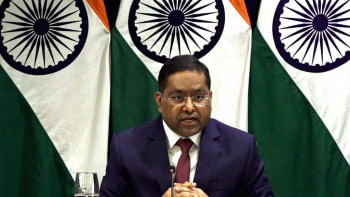Empower youth to fight climate change
Sanowar, a youngster from Austomir Char of Kurigram's Chilmari upazila, had to move house over 12 times in the last 20 years, due to devastating floods and river erosion.
Sraboni Rakhaine, a young lady from Patuakhali's Rangabali island, said they did not have access to drinking water all the time. Most students of the island drop out of school due to frequent cyclones and other natural disasters.
Like Sanowar and Sraboni, many who are from five climate-vulnerable districts -- Khulna, Barguna, Patuakhali, Kurigram and Sunamganj -- shared their stories of how their lives have been affected by the impacts of climate change at a roundtable conference titled "Youth Engagement in Climate Action in Bangladesh".
The conference was held yesterday at national Bangla daily Prothom Alo's office and was organised by Local Government Initiative on Climate Change (LoGIC) Project, which is a joint collaborative initiative between the Bangladesh government, European Union, Sweden, United Nations Capital Development Fund and United Nations Development Program (UNDP).
Abdul Qayyum, associate editor of Prothom Alo,
moderated the roundtable conference.
Saila Farzana, joint secretary of local government division and national project director of LoGIC, said, "The government, non-government organisations and international donors must act together to unleash the infinite potentials of Bangladesh's massive youth population to mitigate the impacts of climate change."
"We must ensure that our pledge to involve our youths in fighting climate change does not remain confined to papers and promises," she added.
Charles Whiteley, head of delegations of the European Union to Bangladesh, said there is no way to flee from the impacts of climate change. Its effects on the lives of youths should be discussed by policymakers.
He said stories shared by Bangladesh's youths are similar to the experiences shared by Swedish environmental activist Greta Thunberg.
Van Nguyen, deputy resident representative at UNDP, said, "This discussion just prior to COP-26 is extremely impactful. More research and discussion should be done to reveal the impact of climate change on the lives of our youths."
According to Global Climate Risk Index 2021, Bangladesh is the seventh most climate change vulnerable country.
According to Bangladesh Climate Change Household Expenditure Survey, 82.6 percent people in climate change affected districts reported that they are being affected by at least one slow onset natural disaster. Households in these districts on average spend Tk 10,822 to take at least one protective measure against natural disasters.


 For all latest news, follow The Daily Star's Google News channel.
For all latest news, follow The Daily Star's Google News channel. 



Comments